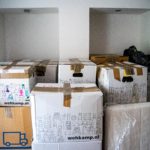 Refugees are almost four times more likely to change addresses than other migrants, according to a new study from the Complexity Science Hub (CSH) in Vienna. Gender and country of origin shape this instability. While the study focuses on Austria, its insights apply globally as the number of displaced people keeps climbing.
Refugees are almost four times more likely to change addresses than other migrants, according to a new study from the Complexity Science Hub (CSH) in Vienna. Gender and country of origin shape this instability. While the study focuses on Austria, its insights apply globally as the number of displaced people keeps climbing.
Most research on refugees looks at their journeys to safety or how they find jobs and health care. Less is known about their housing stability. To explore this, researchers tracked address changes for 1.6 million non-Austrians living in the country between November 2022 and November 2023. Refugees made up 17% of the group and moved far more often than migrants, who come voluntarily and do not face persecution.
Lack of stability
Just 33% of refugees stayed at the same address during the year, compared to 60% of migrants. Refugees from Syria moved the most, changing residences 0.55 times a year—more than twice as often as Ukrainians and nearly six times as often as German migrants. Men moved almost twice as often as women.
Frequent moves come at a cost. While some relocations might reflect better housing or new opportunities, many disrupt community ties, access to education and health care, and financial stability. “Longer stays help people settle in,” the researchers explain.
Legal status plays a big role. Most Syrian refugees in Austria have asylum, while nearly all Ukrainian refugees are classified as displaced persons, with different rights and benefits. Syrians made up 40% of those who moved repeatedly within the same district, followed by Ukrainians (17%) and Afghans (12%).
Migration patterns
The capital, Vienna, drew the most refugees: 16.2% of movements led there, compared with 4.7% heading out. Migrants showed the opposite trend, with more leaving Vienna than moving in.
These findings highlight a growing problem. By the end of 2023, the UN estimated 117.3 million people were forcibly displaced—a number that has doubled in under a decade. Wars, climate change, and political turmoil will likely push it higher.
Stable housing is key to helping refugees start fresh. Understanding how and why they move can guide better policies. Without a steady home, their new lives remain uncertain.